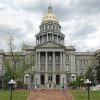The future of the Colorado Republican Party appears to be focused on restricting voting and perpetuating the unfounded claim of widespread election conspiracy. The six candidates vying to head the state’s GOP spoke last Wednesday night at a forum held in Parker on the direction they would take the party–all of whom vowed to close primaries to unaffiliated voters and investigate voter fraud within the state.
The sole candidate who has not openly denied the results of the 2020 presidential election, Stephen Varela, dropped out of the race a day before the Wednesday forum. The field now includes six election deniers: Erik Aadland, Kevin Lundberg, Tina Peters, Casper Stockham, Dave Williams and Aaron Wood.
“I’m going to say what (Kristi Burton Brown) has been afraid to say: Joe Biden is not a legitimate president,” Williams said to applause and head nods from his fellow candidates on stage. “If we don’t trust our elections, we don’t even really need to be up here talking about what we’re talking about here.”
GOP Chair Kristi Burton Brown announced in December she would not seek a second term. The search for her replacement follows a tumultuous year for the party, which saw losses in every statewide election in 2020. Democrats currently enjoy a supermajority in the State House and a near supermajority the senate. The GOP leadership election is scheduled for March 11.
Williams shared much of what the rest of the panel felt regarding alleged election fraud in the 2020 election and the 2022 midterms. He promised to “be at the ready” with lawyers, lawsuits and committees dedicated to investigate claims of election fraud—many of which have been proven to have no basis in fact or actual influence of the outcome of any election.
All candidates agreed there should be some reaching across the aisle for votes—just not at the primary elections. Peters, who lost in the Republican primary for Secretary of State, agreed with closing the primaries, but then said there are lost Democrats searching for a new home in the Republican Party.
“We’ve all been taught to believe the Democrats are our enemy and we’re their enemy,” Peters said. “But I tell you what, there’s an enemy much stronger, much more global that wants to take on this country.”
Peters is currently awaiting trial for illegally accessing voter information while she was the clerk for Mesa County. In pursuit of data to support her claim, Peters illegally accessed confidential voter information. Her conspiracies that the 2020 election was rigged have lent her a following from QAnon supporters and right-wing extremists aiming to overturn the election based on unfounded claims. Those claims led to a failed insurrection of the government Jan. 6, 2021. Regarding her upcoming trial, Peters said, “There’s no way a jury of 12 people is going to put me in prison.”
Lines such as that one earned Peters the most applause of any candidate on stage. Williams’ promises to expose election fraud also clearly connected with the crowd.
Peters repeated her usual platform to reform elections, including banning electronic registration, wireless infrastructure and mail-in ballots.
The issue of election integrity became the primary issue on each of the candidates’ platforms, each of them vowing to create some sort of party committee to reform elections. Stockham said the committee needs to consider the false reports put together by Peters.
“We need to be sober about what the chairman can do to move that forward,” Aadland said, referring to claims that the 2020 election was fraudulent. “We’ve got to sort it through actions, not words.”
Aadland advocated for legislation to clean voter rolls, tighten voter identification laws, implement a “trustworthy system that people believe in so that no fraudulent vote counts and every single real vote—meaningful vote—counts.”
On the issue of whether to keep primary elections open to unaffiliated voters, Wood shared the same sentiment of the other candidates: “Hell no.” The greenest of the six candidates, Wood said God called him to be involved in politics during the pandemic.
“It was a tool designed to weaken our elections, weaken our primary elections,” Wood said. “Thinking that the only way we can strengthen our numbers is by opening our door to any unaffiliated voter in the party and vote for our candidates going out to the general election is a failed strategy.”
Williams supported closing the primaries, providing an example from the Colorado Third Congressional District primary race in which he claimed Democrats were encouraging their supporters to vote for Don Coram over Lauren Boebert. Boebert won the primary and narrowly won the general election in a district that has historically been a Republican stronghold.
Aadland supported creating stronger division between the two parties by getting people “off the fence” in both primaries to “stop the fog of war that sits with the independent voters.”
“Let’s make people choose a side,” Aadland said.



